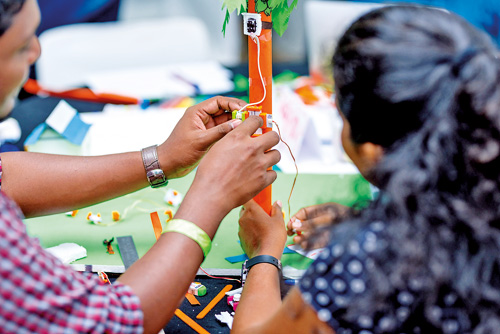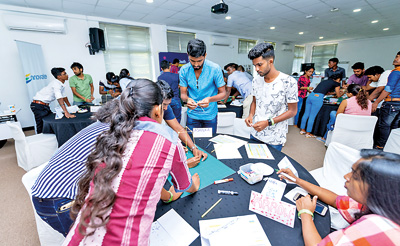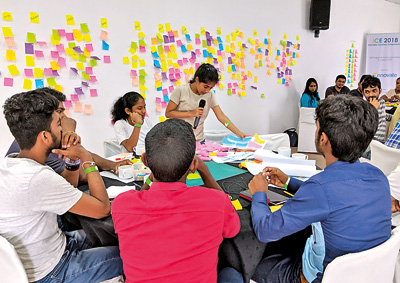Arts
Think creative, solve problems innovatively
View(s):A group of Sri Lankan youth selected from around the country were coached on how to think creatively, solve problems innovatively and arrive at prudent decisions using proven techniques at ‘ICE 2018 Sri Lanka’ workshop organised from November 3-6 at the MAS Athena Fabric Park in Thulhiriya.

Students from all over the country at the ICE workshop
ICE (abbreviated from ‘Innovation’, ‘Creativity’ and ‘Entrepreneurship’), this year’s workshop was the 3rd edition of an annual event since 2016.
The objective of this three-day residential bootcamp was to expand the students’ thought boundaries, allowing them to appreciate, understand and apply design innovation in their efforts to identify and solve problems that impact positively on people’s lives. The 27 participants were from diverse disciplines from all nine provinces and were supported by nine facilitators from diverse backgrounds including entrepreneurs, PhD candidates in various fields, toastmasters and industry experts.
The programme was designed and conducted by Prof. Suranga Nanayakkara, Head of the Augmented Human Lab, University of Auckland, New Zealand, and recipient of ‘Young Innovators Under 35’ for the Asia Pacific Region awarded by MIT Technology Review and ‘Outstanding Young Persons of Sri Lanka’ (TOYP) and INK Fellow.
Earlier, Prof. Nanayakkara was a founding member of the Singapore University of Technology and Design and a visiting Assistant Professor at MIT, Boston. It is using these experiences and expertise that he designed ICE 2018 under which the structure and content shared with these participants are similar in quality and vigour to the Design Thinking Program offered at Stanford D-School for US$12,600 per participant (Rs. 2.1 million). ICE 2018 is free of charge to all participants, who are selected through a rigorous process.
Prof. Nanayakkara who is also the Founder of the global ICE initiative said, “We wish to empower rural Sri Lankan youth by exposing them to these groundbreaking concepts to help them transform their lives, which will enable them to make a positive impact to society. Moving forward, we need to figure out a way to sustain this success beyond the workshop.”
During the workshop, the participants were introduced to the most up-to-date Design Thinking methods that included problem formulation, creative ideation and synthesis, developing a proof-of-concept and prototyping techniques. Having worked in teams, they presented a three-minute pitch of their solution to the invited dignitaries.
Some of the innovative solutions developed by these youth included an easy-to-use smart pH level gauge targeted to solve a major pain-point in the tea plantation sector and an innovative method to deter sexual harassment of schoolchildren.
The Co-founder of Ennovate, Oshala Warsapperuma who is the organizer of this event said, “Our plan is to make these powerful Design Thinking (DT) concepts accessible to a wider audience as their use has proven to make significant positive innovations to mankind.”

